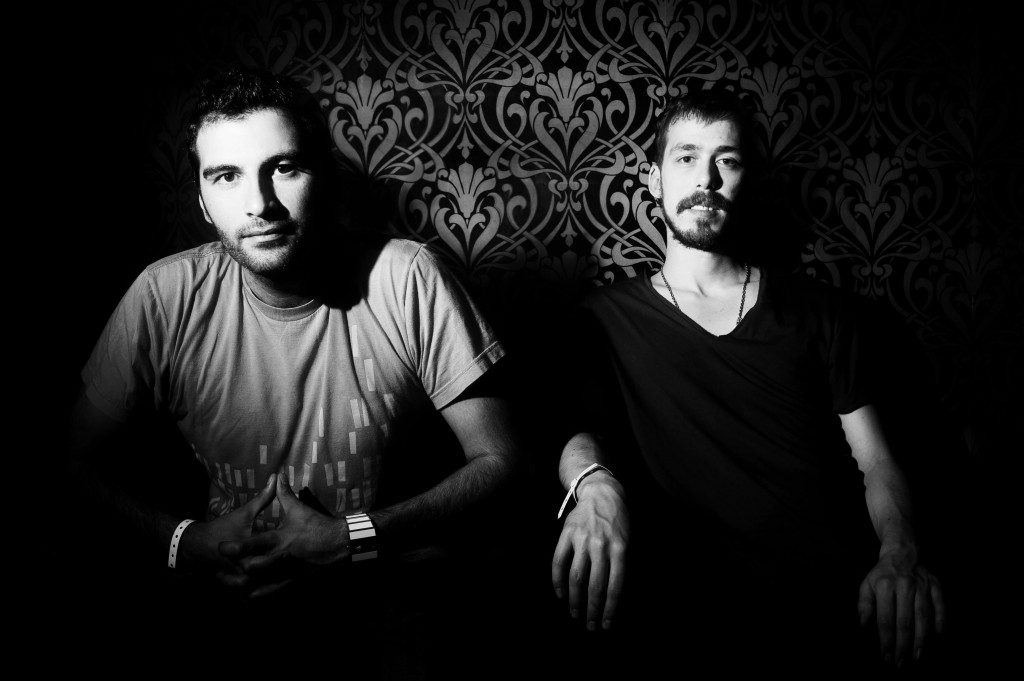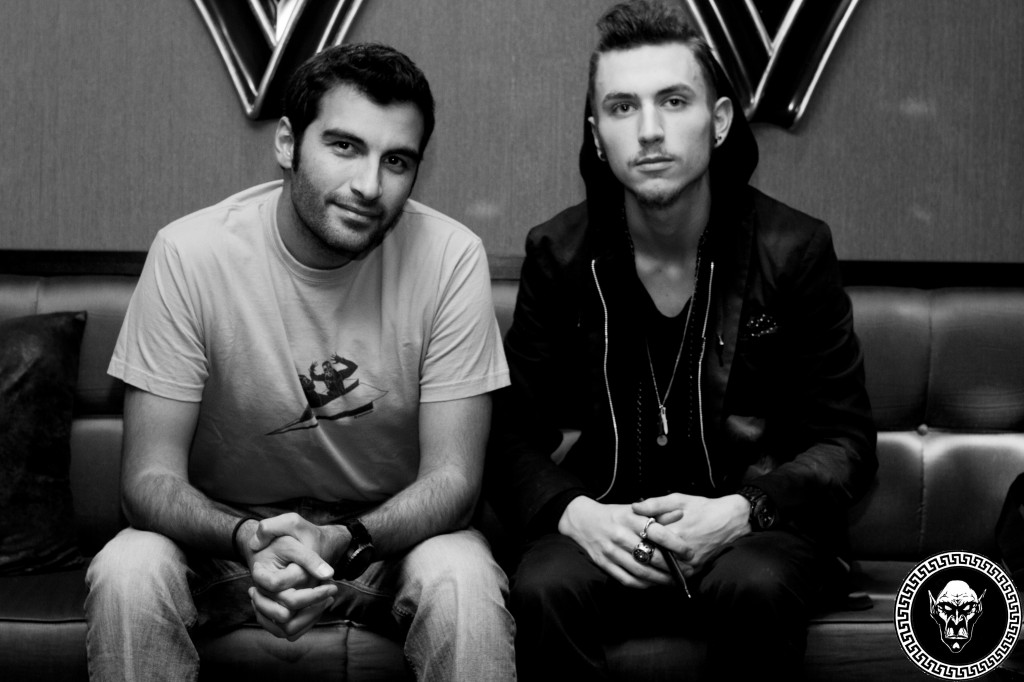Bicep | Interview


In August, moments before stepping onto an airplane to fly back to BC for Shambhala Music Festival, I hit ‘send’ on my interview request emails. I knew that the following six hours on the flight would likely be the only quiet time I’d have before the festival, and so I decided that I should pick one artist to do extensive research for, and hope that it lined up. Not a reliable plan to say the least, but all or none.
As I stepped off of the aircraft – my brain numb from heavy reading, and with a good foundation for a Bicep interview, I powered up my phone. Thankfully, things had gone in my favour. We got the Bicep interview.
Andrew Ferguson and Matthew McBriar are two Belfast natives who currently reside in London. If you haven’t heard of them [you've been living in a cave], their story is unique. They met at a very young age, and had a keen interest in the vibrant music scene in Belfast. Shortly after departing to school abroad (Ferguson in London, while McBriar resided in Dubai), in 2008 the two [with a few friends] started the infamous online publication “Feel My Bicep“, as an outlet for their favourite music. The blog has been known for its consistently pristine taste in both music, as well as the artwork.
Alongside the growth of the blog, their interest in production continued to grow, and the hardships of a long-distance / Skype producing relationship became a problem. So they made the call to go for it for real; as a career. Matthew moved to London, and they got to it.
Back to the interview. There I am at Shambhala, dressed in whatever absurd swagger I felt would suit the long evening ahead. Mid-day when I arrived at the Pagoda Stage and was speaking to the stage managers, they told me that there was a 50% chance that Bicep and Eats Everything might not make it to the festival. My heart sunk. Not for the interview alone, but because I was looking forward to these acts perhaps the most of any at the festival. With time, it became known that they weren’t going’t make it, and so we present to you the first ever long-distance interview. With Bicep.
Low-Life: This interview was supposed to happen in person at Shambhala, but we were disappointed to find out that you and Eats Everything couldn’t make it. United Airlines gave you some trouble.. What happened there?
Bicep: Yeah it was a bit of a mess. We boarded the plane twice only to be sent back to the airport when we were on the runway. On the second occasion the cabin actually filled with smoke – I think it was a dodgy aircon unit. By the second failed attempt it left us with no time to get to the festival so we had to make our way home – very long day! Pretty gutting, as it was the main reason we came across the pond in the first place.
LL: Damn. Both of you were missed – as much as we enjoyed Justin Martin’s heroic three hour set.
Moving on, what’s Bicep been up to lately?
B: We have just finished recording the second EP for our own label, Feelmybicep, which we plan to get out at some stage in November. After nearly half a year of looking for a studio space we have eventually found somewhere in London that fits our needs. Over the next couple of weeks we will be building on a full analog set-up, which we have worked towards over the last 2 years.
LL: You played a debut show at the Robert-Johnson in Frankfurt recently. Tell us a bit about that venue, and how the experience was for you?
B: Robert Johnson is a unique club with its own vibe that you can’t really compare to anywhere else. It has a very personal feel, because the people who run the club really make an effort to create the best atmosphere possible. The sound system and mixer are so in-tune and responsive to each other that you feel a part of it. Having used it on a few occasions now I would say the Rane Rotary is one of my favourite mixers I have ever used.
LL: Having experience throwing your own parties, give us a ‘how-to’ guide on what elements you feel are most integral to throwing a dimensional event?
B: Firstly, I think a really well programmed line-up. The music should develop and flow like a good mix tape – the warm up is utterly essential (and often a forgotten art) and should be stripped back and slow. A live act brings a strong energy to the evening and some techno to finish. We never want to fall short on production – 15ft Bicep arms and turquoise neons are a must!
LL: Your Plastic People parties were a til-1am party. How do you feel the vibe of an early function differs from that of an after-hours red-light affair? Do you prefer one to the other?
B: Yeah, the late night sleaze is much better suited to Plastic People. We gave the midweek parties a go but I think for what we wanted late nights would work better – we want people to really let loose. We always have gigs at the weekend so it was going to be a compromise no matter what. The mid week early parties worked really well but after three of them we felt they had run their course.
LL: I read in an interview that your ‘dream location’ to play would be in Cappadocia in Turkey. I Googled it and it looks mental. Have you been or played there yet?
B: Not yet, still on the list. I’m not sure how into techno and house they are out there though… one day
LL: Here’s a quote from Andrew:
‘We gave ourselves a year, and if we couldn’t comfortably pay rent after that, we’d have gone back to our normal jobs.’
RZA from Wu-Tang made the group agree to a five-year plan, with a similar purpose.
While the path of a rap group in the 90s is hardly comparable; you cut that significantly with a one-year goal. Did you feel confident at that time, or was it surprising when you attracted global recognition at such a rate?
B: Not at all, at the time it was a big risk and the following 6 months were really tough. The main goal was to survive and we kept looking to the next week/pay-packet and worked around that. By doing that we never really noticed the rise because it felt more gradual on our side.
‘Making records, getting fucked, eating great food, bench pressing girls, climbing into industrial freezers, going for burgers, causing trouble in China and hanging out with air hostesses and general nutters.’
LL: A summary to an admittedly more rock-star lifestyle than some producers we’ve spoken with, but was this a humble summation? Eats Everything disclosed to us a story about dropping acid and eating a cactus. Any specific stories of your own that come to mind?
B: Yeah that is really a humble summation! We left out stuff like hi-jacking boats in Croatia, stealing taxis in Amsterdam and setting off fireworks in clubs. If we disclosed too much we would get locked up and never be allowed a visa back to your fine country!
LL: Wrapping up shortly, favorite tunes at the moment?
B: We love the Untzz label from Adelaide at the moment, they have been putting out a stack of well-rounded EPs over the past year, and it would be hard to choose one particular tune from them.
LL: How many chin-ups can you do?
B: In a row? One handed? Usually lose count.
LL: Plans for the rest of the year?
B: Finish off some more EPs for next year on our label and also work on some remixes for our friends.
LL: Thanks for your time.
Connect with Bicep:
Facebook: https://www.facebook.com/feelmybicep
Twitter: https://twitter.com/feelmybicep
SoundCloud: https://soundcloud.com/feelmybicep
Web: http://www.feelmybicep.com/
KO + Rader












